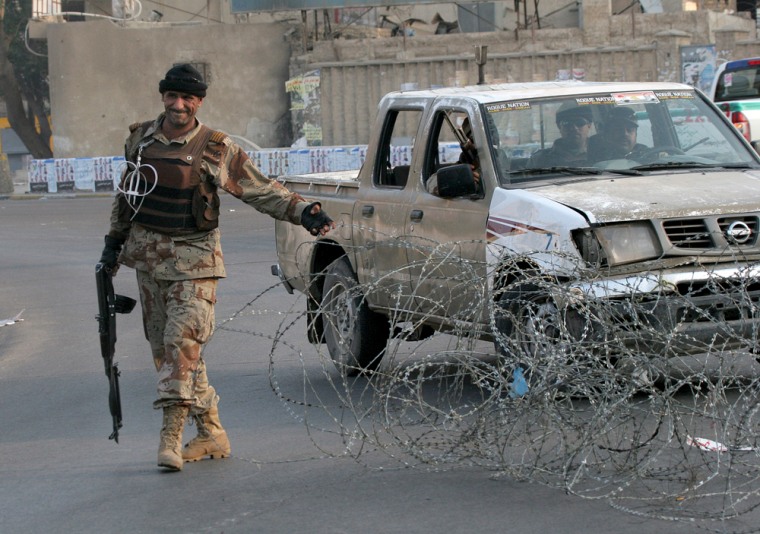The new Iraqi army colonel swaggered into the city council meeting and got straight to the point.
“Control your towns or we will. If you don’t, we’re going to do some things in your towns that we don’t want to do,” Col. Saman Talabani warned the assembled tribal and city leaders. “I don’t believe the city council when it says it doesn’t know who’s doing the attacks.”
One councilman was already under arrest for allegedly firing mortar rounds at the home of one of Talabani’s men, and the brigade commander was here to read the riot act. Two days later, on Dec. 3, came the response — a roadside bomb that killed 19 Iraqi soldiers and highlighted the struggle of wills that lies ahead for the Iraqi army as it sets out to take control of the country and hasten the day when American forces can go home.
The meeting with the leaders of the region 55 miles northeast of Baghdad was Talabani’s first, but he quickly dispensed with pleasantries, glaring at his audience and raising his voice.
The dozen councilors, most in dark tribal robes, listened quietly.
“If our soldiers get shot, I don’t care — they can shoot back and level a house,” he said, visibly angry because several of his soldiers had been wounded two days earlier in a complex ambush that included attacking the ambulance that came to evacuate the wounded.
Then he strapped on his bulletproof vest and walked out.
With a fifth battalion just added to Talabani’s command, nearly 4,000 Iraqi soldiers are in Diyala province, adjacent to Baghdad to the north and east. Most are operating independently of U.S. forces to track militants and keep a lid on ethnic and religious strife.
Struggle to balance security, democracy
The Iraqi army, growing in numbers and strength, has begun to challenge local leaders for control of large swaths of Iraq, trying to reassert the dominant position it held during the Saddam Hussein era.
American forces face a delicate task — to pump up the military and at the same time build up a police force that will eventually supplant the troops but is still too weak to do so.
“You don’t want the people to get used to the Iraqi army as a police force,” said Capt. Joseph Peppers of Chicago, who trains Iraqi army officers in Diyala.
Vali Nasr, a professor at the U.S. Naval Postgraduate School in Monterey, Calif., said: “The greatest casualty of the insurgency in Iraq is democracy because the violence will lead to emphasis on security forces above all else, and that will in time translate into military political power.”
At least 200 Iraqi soldiers have been killed or wounded in the province in the past year, some of them in an attack that destroyed the local army headquarters next to Abarra’s council chambers.
High hopes for Iraqi forces
Despite a spike in attacks during the last two months, U.S. soldiers insist that the Iraqi army will be able to independently fight insurgents by next summer and already often responds to attacks before the Americans do.
“They’re outstanding. They can easily go out right now by themselves,” said David Basil of Brethren, Mich., a sergeant in the 2nd Battalion, 34th Armored Regiment, as he prepared for a mission with Iraqi soldiers to seize weapons hidden in orange groves.
The U.S. military acknowledges that the insurgency in Diyala has deep roots. Abarra was home to Izzat Ibrahim al-Douri, a Saddam confidant who remains at large.
And the problem is compounded by the mix of ethnic groups and religious beliefs. Talabani is a cousin of President Jalal Talabani of Iraq’s Kurdish enclave. The insurgency is backed by the Sunni minority, dominant under Saddam and now angry and envious at the rise of the Kurds and majority Shiites.
“I went to Kurdistan and I saw many municipal projects and people living a good life,” said Adnan Khathban Hamed al-Tamimi, the Abarra city council chairman, expressing the alienation and envy felt by many Sunni Arabs. “Here we just have rocket-propelled grenades and bombs.”
